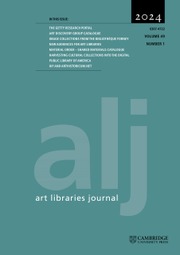No CrossRef data available.
Article contents
Viewpoint: How critical can librarians be?
Published online by Cambridge University Press: 02 October 2024
Abstract
Critical librarianship has become embedded into the epistemological structure of the LIS profession. Those working in art libraries and the Art Libraries Journal have played no small role in this, fostering progressive discussions around issues of social injustice that orbit the library and its functions. Nevertheless, the kernel of critical theory that developed out of the Frankfurt School centred upon class and economics. Librarianship, especially art librarianship, continues to be a middle-class career requiring an expensive higher qualification to enter. This requirement indicates the contradictions operating within and around the sector. As the commodification of education continues to creep in, class and economics are urgent topics that demand to be addressed by the critical librarianship movement. Yet those who practice critical librarianship remain employees of this very system and as such, the question posed is, what, if anything, can librarians do about their role within the education system to disrupt the commodification of education? The proposal is offered that librarians and artworks have more in common than seems possible. This idea is explained by briefly introducing artwork as a monad, concluding that art and perhaps librarians reflect the society that created them but cannot change it. Nevertheless, the very existence of art reflects the possibilities of such change, and maybe this is its role.
- Type
- Research Article
- Information
- Copyright
- Copyright © The Author(s), 2024. Published by Cambridge University Press on behalf of ARLIS
References
1. ALJ dedicated a special issue to the subject in 2019 (vol 44 issue 2), the ARLIS conference was on Neutrality Bristol UK, 2022, UAL conference Towards a critical (art) librarianship in London, UK in May 2018. #critlib hashtag, NA Critical Librarianship Special Interest Group in 2018
2. Gregory, Lua and Higgins, Shana, “In Resistance to a Capitalist Past: Emerging Practices of Critical Librarianship in The politics of theory and the practice of critical librarianship, ed. Nicholson, K., & Seale, Maura (Sacramento: Library Juice Press, 2018), 25Google Scholar
3. Popowich, Sam, “Ruthless Criticism of All that Exists”: Marxism, Technology, and Library work, in The politics of theory and the practice of critical librarianship, ed. Nicholson, K., & Seale, Maura (Sacramento: Library Juice Press, 2018), 46Google Scholar.
4. Jameson, F. 2007. Late Marxism: Adorno or the Persistence of the Dialectic. London: VersoGoogle Scholar.
5. Buschman, John. “Education, the Public Sphere, and Neoliberalism: Libraries' Contexts.” The Library Quarterly 90 (2020): 154CrossRefGoogle Scholar.
6. ‘The best reading for the largest number at the least cost.’ Wiegand, Wayne A. The Politics of an Emerging Profession: The American Library Association, 1876–1917. Contributions in Librarianship and Information Science; No. 56. New York; London: Greenwood Press, 1986. Preface 1
7. Popowich, Sam, “Ruthless Criticism of All that Exists”: Marxism, Technology, and Library work, in The politics of theory and the practice of critical librarianship, ed. Nicholson, K., & Seale, Maura (Sacramento: Library Juice Press, 2018), 49Google Scholar.
8. Drabinski, Emily (2019). What is critical about critical librarianship? Art Libraries Journal, 44, 49.
9. Hines, S., & Ketchum, David, editors (2020). Critical librarianship. United Kingdom: Emerald Publishing, 2020CrossRefGoogle Scholar.
10. Popowich, Sam. Confronting the democratic discourse of librarianship: a Marxist approach. (Sacramento, CA: Library Juice Press, 2019). 33Google Scholar
11. Crilly, J. (2019). A reflexive lens: Critical librarianship at UAL. Art Libraries Journal, 44(2), 83–91CrossRefGoogle Scholar. https://doi.org/10.1017/alj.2019.9 89
12. This is a much wider and deeper conversation beyond the realms of the topic of this article. It deserves to be treated as a much bigger debate by the LIS profession.
13. Fobazi Ettarh, “Vocational awe and librarianship: the lies we tell ourselves”, In the Library with the Lead Pipe: an open access, open peer-reviewed journal. 10/1/2018
14. Appleton, Leo. 2019. “Viewpoint: Is Critical Art Librarianship Actually a Thing?” Art Libraries Journal 44 (2): 94. doi:10.1017/alj.2019.10.CrossRefGoogle Scholar
15. See Adorno, Theodor W., Adorno, Gretel, and Tiedemann, Rolf. Aesthetic Theory. London: Continuum, 2004Google Scholar.
16. Leibniz, Gottfried Wilhelm, and Strickland, Lloyd. Leibniz's Monadology: A New Translation and Guide. Edinburgh: Edinburgh University Press, 2014.
17. Peters, M. (2020). The Windowless Monad. In: Popular Music, Critique and Manic Street Preachers. Palgrave Macmillan. https://doi.org/10.1007/978-3-030-43100-6_3 64
18. Fobazi Ettarh, 2018.
19. Marx, Karl and Engels, Frederick The German Ideology. Part One, with Selections from Parts Two and Three, Together with Marx's ‘Introduction to a Critique of Political Economy. London: Lawrence & Wishart, 1970Google Scholar.


